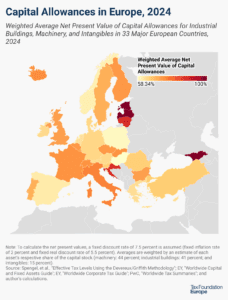
Windfall Profit Taxes in Europe, 2024
4 min readBy:Even though energy prices have declined from their peak, some European countries continue to rely on windfall profits taxes—a one-time taxA tax is a mandatory payment or charge collected by local, state, and national governments from individuals or businesses to cover the costs of general government services, goods, and activities. levied on a company or industry when economic conditions result in large, unexpected profits—to fund relief measures for consumers.
As early as March 2022, the European Commission recommended that Member States temporarily impose windfall profits taxes on all energy providers in its REPowerEU communication. The Commission suggested such measures should be technologically neutral, not retroactive, and designed in a way that does not affect wholesale electricity prices or long-term price trends. In October 2022, the Council of the European Union agreed to impose an EU-wide windfall profits taxA windfall profits tax is a one-time surtax levied on a company or industry when economic conditions result in large and unexpected profits. Historically, such taxes have targeted oil and energy companies when costs have risen, especially from war or other crises. , or “solidarity contribution,” on fossil fuel companies (oil, gas, coal, and refining sectors), though with a different design than the Commission’s recommendations. At the same time, a cap was set on market revenues for electricity generators that use infra-marginal technologies to produce electricity, such as renewables, nuclear, and lignite.
The EU anticipated that the two policies would jointly raise about €140 billion, of which €25 billion would be revenues from oil and gas companies collected through the solidarity contribution. The revenue would then be used to partially offset households’ high energy bills “in a non-selective and transparent measure supporting all final consumers.”
Between 2022 and 2023, 15 of the 27 Member States applied the solidarity contribution, while eight adopted an equivalent national measure. Three countries—Luxembourg, Latvia, and Malta—reported that they do not have in-scope companies, and Cyprus never adopted the regulation.
Although no longer a part of the EU, in 2022, the British government also implemented a windfall profits tax that exclusively targets companies engaged in oil and gas extraction.
The implemented windfall taxes in Europe differed significantly in their structures and their tax rates (ranging from 25 percent in the United Kingdom to 80 percent in Slovenia).
Additionally, many of the proposed and enacted measures are not proper windfall profits taxes—they go beyond merely taxing windfall profits. For oil and gas companies, European countries followed the windfall tax base definition from the EU’s regulation as the difference between the current profits and the profits generated over a baseline period. Nevertheless, these incremental profits are not necessarily excess or supernormal returns and a windfall tax could translate into double taxation of regular profits.
In some countries with windfall taxes, the tax baseThe tax base is the total amount of income, property, assets, consumption, transactions, or other economic activity subject to taxation by a tax authority. A narrow tax base is non-neutral and inefficient. A broad tax base reduces tax administration costs and allows more revenue to be raised at lower rates. is not designed in a way that exclusively captures the windfall profits generated by the spikes in energy and oil prices. A tax on electricity sold over an arbitrarily determined price (as most European countries implemented) or on total sales (as in Spain) resembles more of an excise tax.
Some countries didn’t limit the scope of the windfall tax to energy producers or oil and gas companies. Currently, the Czech Republic, Hungary, Lithuania, Slovakia, and Spain extended the scope of the windfall profits taxes to cover the banking sector.
Although the EU regulation clearly states that windfall profits taxes should be a temporary mechanism and “the duration of the measure should be limited and tied to a specific crisis situation,” Spain and Hungary have extended it until 2024, the Czech Republic has extended it until 2025, Lithuania has extended it until 2026, and Slovakia until 2027. The United Kingdom, which also implemented a windfall profits tax on fossil fuel companies in 2022, extended its application to 2030.
The flawed design of these windfall profits taxes has created problems in countries that implemented them. An EU Commission report finds that the “diverging implementation strategies across Member States have reportedly led to significant investor uncertainty,” and, therefore, the Commission’s report proposed to end these measures. Furthermore, European Parliament research also finds that historically, windfall taxes have affected investment. Additionally, the Spanish and British taxes are threatening domestic renewable energy investments.
It’s unlikely that these windfall taxes will achieve their revenue goals. Instead, they distort the market by penalizing domestic production, reducing investment in green energy, and punitively targeting certain industries without a sound tax base. Given that energy prices have declined, policymakers should consider repealing windfall taxes altogether and instead focus on principled tax policy reforms that generate stable revenue over time.
Windfall Profits Taxes in Force in European Countries, as of 30 August 2024
| Country | Tax Rate | Scope | Base | Status |
|---|---|---|---|---|
| Czech Republic | 60% | Companies in the energy and fossil fuel sectors with a total annual turnover in 2021 of at least CZK 2 billion and a current total annual net turnover of at least CZK 50 million. Banks with a current net interest income of at least CZK 50 million and a net interest income in 2021 of at least CZK 6 billion. | Profit margin exceeding 120% of the average profit of 2018, 2019, 2020, and 2021. | In Force (Applicable for three years: 2023, 2024, and 2025). |
| Hungary | A variety of rates depending on the sector | Producers of petroleum products and mining royalties. Renewable energy, pharmaceutical distributors, airline companies, credit, financial institutions, etc. | Varies by industry. | In Force (The first one was introduced as early as 1 July 2022; most are applicable for three years: 2022, 2023, and 2024. The bank tax will stay in effect up until 2025). |
| Lithuania | 60% | Credit institutions | 50 percent of the net interest income (interest income minus interest expenses) that exceeds the average net interest income of the previous four years. | In Force Applicable initially for two years, 2023 and 2024, the tax has been extended until 2026). |
| Slovakia | 30% | Banks | Banking profits. The windfall tax, together with the regular corporate tax, will raise the effective tax rate for the banking sector to 45% in 2024. By 2027, the effective tax rate will drop to 33% since the tax rate will be cut by 5 percentage points per year between 2025 and 2027. | In Force (Applicable for four years from 2024 to 2027. The tax rate will be cut by 5 percentage points per year to 15% in 2027). |
| Spain | 1.2% for energy companies and 4.8% for banks | Energy companies (gas, oil, and electricity) and banks. | Sales of domestic power utilities (companies with an annual turnover exceeding EUR 1 billion in 2019). Bank’s net interest income and net fees if the net income from these sources exceeded €800 million in 2019. | In Force (In December 2022, two windfall taxes on the banking sector and energy companies were approved. Applicable for two years: 2023 and 2024. Previously, in September 2021, Spain approved a temporary mechanism that was in force until 31 December 2022. The mechanism consisted of a temporary reduction in the remuneration of electricity production activities to reduce windfall profits earned due to higher gas and carbon prices. The tax was payable if the gas price was higher than EUR 20/MWh. However, later on, a series of exclusions were approved, and many energy providers were left outside the scope of the mechanism). |
| United Kingdom | 38% (35% up to 1 November 2024) | Oil and gas companies operating in the UK and the UK Continental Shelf. | On the same profits that are already subject to the UK’s oil and gas 40% headline tax, generating an effective tax rate of 78%. | In Force (Approved on 11 July 2022, applicable to profits generated on or after 26 May 2022, up to 31 March 2030. Jeremy Hunt raised the tax from 25% to 35% in January 2023 and, in the 2024 budget announcement, stated that it would remain in place until March 2029. However, with the new labor government, the tax was extended for one more year to March 2030 and the rate was increased to 38% starting from 1 November 2024). |
Stay informed on the tax policies impacting you.
Subscribe to get insights from our trusted experts delivered straight to your inbox.
SubscribePrevious Versions
-
Windfall Profit Taxes in Europe, 2023
13 min read -
Windfall Profit Taxes in Europe, 2022
9 min read





